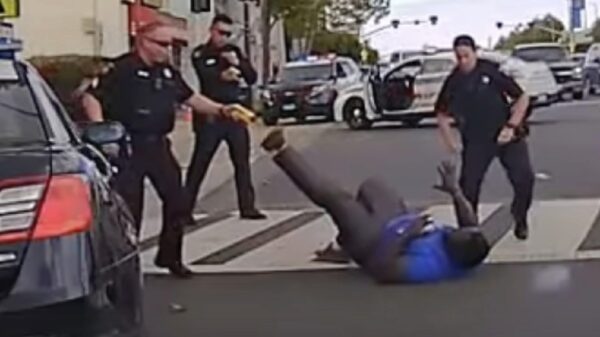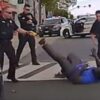
Black people are nearly four times more likely to be arrested for marijuana possession than a white person, even though Black and white people use marijuana at similar rates.
A 2020 American Civil Liberties Union (ACLU) report, “A Tale of Two Countries: Racially Targeted Arrests in the Era of Marijuana Reform,” analyzed marijuana arrests from 2010 to 2018 and examined racial disparities that exist at the local, state and national levels.
Black people were arrested at higher rates across every state.
With the passage of Proposition 64: Adult Use of Marijuana Act in California in 2016, which legalized personal use of marijuana for adults 21 years of age and older, and reduced criminal charges for specific marijuana-related charges, advocates expected improvements in cannabis-related arrest rates.
To some extent, circumstances did improve.
California Marijuana Arrests 2011 to 2019

In an effort to address the harm caused by a legacy of the war on drugs and the disproportionate impact on Black people and communities of color, Prop. 64 also allowed individuals with marijuana convictions who completed their sentences, to petition the court for the reduction or dismissal of their marijuana convictions.
But the harm established by decades of aggressive policing and harsh drug policies continues to weigh down Black Americans and communities of color. Five decades following the beginning of the war on drugs, gaping holes in drug policy reform remain.
A misguided war
In 1971, President Richard Nixon declared a war on drugs, a global campaign that criminalized the use of drugs, including marijuana. In 1972, a Nixon-appointed commission unanimously recommended the decriminalization of possession and personal use of marijuana, which Nixon rejected.
Nixon’s war on drugs gave way to increased incarceration rates for nonviolent drug offenses. Although 11 states decriminalized marijuana between 1973 and 1977, aggressive penalties for drug use reemerged under Ronald Reagan’s administration. The number of people behind bars for nonviolent drug law offenses ballooned from 50,000 in 1980 to over 400,000 by 1997, according to the Drug Policy Alliance.

When George H.W. Bush assumed office in 1989, he further escalated the war on drugs during his infamous first oval office speech in which he held up a bag of cocaine and declared the U.S. needed “more prisons, more jails, more courts, more prosecutors.”
https://www.c-span.org/video/standalone/?c5083324/user-clip-president-bush-drug-problem
In 1989, during his first oval office address, former President George H.W. Bush delivered his infamous comments, “more prisons,more jails, more courts, more prosecutors,” further escalating the war on drugs. (Source: C-SPAN)
Harsh drug strategies were adopted over the course of the ‘80s and ‘90s and continued through Bill Clinton’s presidency, including legislation he blocked which would have equalized the penalties for the use of crack and powder cocaine.
Clinton’s policies further contributed to the abundance of prisons and jails under the Violent Crime Control and Law Enforcement Act of 1994. The 1994 bill notably gave way to the “three strikes and you’re out” policy. Under the bill, a person who was convicted of a third violent felony and who had two prior convictions (including serious drug offenses) were mandated to life in prison.

While the war on drugs may be declared over — the effects of the 50 plus-year campaign against drugs still linger as Black people and people of color continue to be severely impacted by drug arrests and drug-related incarceration.
“When you look at who’s arrested, who’s sentenced to jail and prison time, who comes out on parole and probation, and then who’s excluded from employment because of criminal convictions, it’s always Blackness that’s paying the highest price,” Vonya Quarles, cofounder of Starting Over, Inc., stressed.

Flaws in the execution of cannabis resentencing legislation
While states like California have legalized marijuana for personal use and have decriminalized marijuana possession, a 2021 California Cannabis Policy Brief noted that Black people are still overrepresented in felony and misdemeanor marijuana arrests by “roughly three (felony) and two times (misdemeanor) their representation in the population.” Black people makeup 6.5% of the total population in California.

In January 2019, Assembly Bill 1793: Cannabis Convictions Resentencing took effect. While Prop. 64 allowed individuals to petition the court for reduction or dismissals, AB 1793 required the Department of Justice (DOJ) to review cases that may be eligible for clearance and notify prosecutors of cases to be dismissed.
Despite the passing of this reformative law, a 2022 Los Angeles Times investigation found that at least 34,000 marijuana records had not been processed by California courts at the time of their investigation even though the law required cases be reviewed for resentencing by July 1, 2020. The LA Times reported, “Some courts — including in Riverside and San Bernardino. . . haven’t fully processed a single case.”
At the time of publication in 2022, the LA Times investigation reported that 5,400 cannabis cases in San Bernardino were waiting to be reviewed and processed. The report further indicated Riverside County Superior Court had not completed processing of any of its 21,000 cases.
Convictions Potentially Eligible for Relief, Location (July 2019)
According to the DOJ’s Quarterly Legislative report, there were a total of 103,737 past convictions that were identified as being potentially eligible for relief in July 2019 across Los Angeles, Riverside, San Bernardino and Orange counties. (Data visual by Alex Reed for BVN)
The California Department of Justice (DOJ) sent a total of 11,121 cannabis-related cases to San Bernardino County for review and a total of 8,164 cases for review to Riverside County. An inquiry by Black Voice News found that the counties actually had a higher volume of cases, which included cases not flagged by the DOJ.
While the counties grappled with a larger than expected caseload, they were also tasked with separating cases that were not eligible under AB 1793, but were included in the DOJ files.
“As the counties retain the conviction record, DOJ’s look was expansive and it was always contemplated that a review of the actual conviction record would indicate that certain individuals referred by the DOJ were not in fact eligible,” according to a statement from the Attorney General’s office.
Another consideration that perhaps impeded timely compliance in Riverside and San Bernardino counties was a glaring legislation gap. Although the legislation required the prosecution to review cases for resentencing by July 1, 2020, there was no deadline assigned for the courts to process “cannabis relief” in the initial legislation.
Without a clear deadline specified for the courts to complete their respective tasks, there was no apparent sense of urgency to review, process and clear cases at the local level.
Providing Californians the relief they deserve
Julia S. Van Hook, communications & public affairs officer for the Superior Court of San Bernardino County, explained that the state-wide shutdown due to the COVID-19 contributed to the delay in processing eligible cases.
“Processing these modifications required the attention of experienced staff who understood the nuances of criminal litigation. During that time, we had limited staffing due to COVID, coupled with staffing shortages related to illnesses and school closures. There was also a lot of manual work, and the court updated every case on both lists,” Hook wrote in an email back in March. The court processed cases both from the DOJ’s list and additional cases identified by the county.
California Attorney General Rob Bonta, the author of AB 1793 addressed counties’ slow moving efforts to clear eligible marijuana cases in December of 2021.
“Since this law went into effect, tens of thousands of Californians have been able to turn the page and make a fresh start – but unfortunately there are still some who are waiting for relief. I urge counties to prioritize processing their records so that these Californians can finally get the relief they deserve,” said Attorney General Bonta in a statement.
Riverside County courts also attributed the delay in the processing time for cannabis conviction resentencing to “available judicial or staffing resources and overall backlogs related to the COVID pandemic.”
While the COVID-19 pandemic proved to be an obstacle for these counties, funding was not. Courts across the state received a combined $16.83 million from the Judicial Council to complete this work. Of that funding, Riverside courts received a total of $638,418 while San Bernardino courts received a total of $840,828 in funding, but returned $687,432.76 of unspent funds. The county did not respond to further inquiries regarding why the funding was returned unused.

While county officials offered explanations for the processing delays, Quarles offered her perspective of the impacts of such delays.
“When it comes to purging those records, of course more Black and brown people are impacted by those records. I’m not saying that’s why the county [dragged] its feet, but I think those are factors and it doesn’t matter why the county [dragged] its feet, it just matters that it did. It impacted the lives of Riverside County and San Bernardino County residents,” said Quarles.
The consequences of having convictions on a personal record can be far-reaching, resulting in immediate effects such as inability to access housing, difficulty getting a job and losing professional licenses. Other consequences are known as “invisible punishments,” according to John Reitzel, a criminal justice professor at California State University, San Bernardino. Invisible punishments refer to consequences outside of the law such as employment discrimination.
This explanatory series aims to examine the factors that contributed to the delay in processing thousands of cases in Riverside and San Bernardino counties, how those delays impacted communities of color who have been historically affected by the legacy of America’s war on drugs in the U.S. and how the lack of uniformity and standards across counties regarding the implementation of AB1793 led to delays in processing records.
This investigation was supported with funding from the Data-Driven Reporting Project. The Data-Driven Reporting Project is funded by the Google News Initiative in partnership with Northwestern University | Medill









You must be logged in to post a comment Login